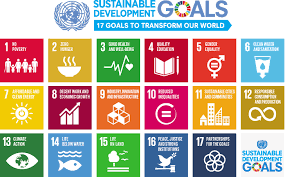17 Sustainable Development Goals: A Path Towards a Better Future
Since the adoption of the 17 Sustainable Development Goals (SDGs) by the United Nations in 2015, countries around the world have been working tirelessly towards achieving these ambitious targets by 2030. The SDGs are a universal call to action to end poverty, protect the planet, and ensure prosperity for all.
The 17 Sustainable Development Goals are:
- No Poverty
- Zero Hunger
- Good Health and Well-being
- Quality Education
- Gender Equality
- Clean Water and Sanitation
- Affordable and Clean Energy
- Decent Work and Economic Growth
- Industry, Innovation, and Infrastructure
- Reduced Inequality
- Sustainable Cities and Communities
- Responsible Consumption and Production
li><13. Climate Action/li><14. Life Below Water/li><15. Life on Land/li><16. Peace, Justice, and Strong Institutions/li><17. Partnerships for the Goals/li>
The SDGs address a wide range of global challenges, from poverty and hunger to climate change and inequality. They recognise that these issues are interconnected and require integrated solutions that involve governments, businesses, civil society, and individuals.
By working towards the SDGs, countries can create a more sustainable future for all people while preserving the planet for future generations. It is essential that we all play our part in achieving these goals to ensure a better world for everyone.
Five Practical Tips to Advance the UN’s Sustainable Development Goals in Everyday Life
- Reduce waste by recycling and reusing materials to support Goal 12
- Conserve energy at home by using energy-efficient appliances and turning off lights when not in use to contribute to Goal 7
- Support local farmers and buy seasonal produce to promote Goal 2
- Educate yourself about climate change and its impact on the environment to help achieve Goal 13
- Volunteer for environmental clean-up activities in your community to support Goal 14
Reduce waste by recycling and reusing materials to support Goal 12
Reducing waste through recycling and reusing materials is a crucial step towards supporting Goal 12 of the 17 Sustainable Development Goals. By adopting sustainable practices like recycling and reusing, we can minimise the environmental impact of our consumption patterns, promote responsible production methods, and contribute to building a more sustainable future for all. This simple yet effective action not only conserves valuable resources but also helps in reducing pollution and mitigating the effects of climate change, aligning with the overarching aim of Goal 12 to ensure sustainable consumption and production patterns globally.
Conserve energy at home by using energy-efficient appliances and turning off lights when not in use to contribute to Goal 7
One effective way to contribute to Goal 7 of the 17 Sustainable Development Goals is by conserving energy at home. By using energy-efficient appliances and making a habit of turning off lights when not in use, individuals can significantly reduce their energy consumption and carbon footprint. This simple yet impactful action not only helps in achieving Goal 7 – Affordable and Clean Energy but also promotes sustainable living practices that benefit both the environment and future generations.
Support local farmers and buy seasonal produce to promote Goal 2
Supporting local farmers and buying seasonal produce is a simple yet impactful way to promote Goal 2 of the 17 Sustainable Development Goals, which focuses on Zero Hunger. By choosing locally grown foods, we not only support small-scale farmers and their livelihoods but also reduce the carbon footprint associated with transporting food over long distances. Additionally, consuming seasonal produce encourages biodiversity and helps to preserve traditional farming practices that are essential for sustainable food production. By making conscious choices in our daily lives, we can contribute towards achieving a world where everyone has access to nutritious and sufficient food.
Educate yourself about climate change and its impact on the environment to help achieve Goal 13
To contribute to the achievement of Goal 13 – Climate Action, it is crucial to educate oneself about climate change and its profound impact on the environment. By understanding the science behind climate change, its causes, and consequences, individuals can make informed choices and advocate for sustainable practices that mitigate its effects. Empowering oneself with knowledge about climate change is a vital step towards fostering a collective commitment to combatting this global challenge and safeguarding our planet for future generations.
Volunteer for environmental clean-up activities in your community to support Goal 14
One impactful way to contribute to Goal 14 of the 17 Sustainable Development Goals is by volunteering for environmental clean-up activities in your community. By actively participating in efforts to clean up water bodies and coastal areas, you can help preserve marine life and ecosystems, ultimately working towards the goal of conserving and sustainably using the oceans, seas, and marine resources. Your involvement in such initiatives not only benefits the environment but also raises awareness about the importance of protecting our oceans for future generations.
